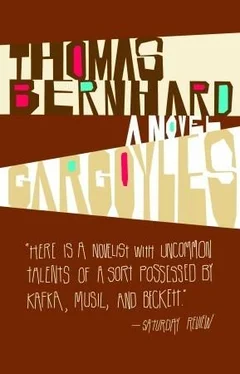Her son, she said, was “huge,” with unusually long arms and “coarse” hands, but in the past he had always been good-natured. His father had been unhappy about the boy from the earliest years, for as soon as the child began to talk it became apparent that he’d never be very bright. And in fact his father had twice kept him back in his own elementary school. There’d never been any chance of his going to high school. Because of this son her husband had drifted more and more into a terrible depression. Tormented by doubts about the whole process of education, he’d found no peace, let alone any more satisfaction in his work. A psychiatrist he went to see in Graz did not help, merely cost a lot of money. The two of them still kept hoping that the boy’s sad condition, which cast a blight on both their lives, would end some day. But they had waited in vain for some sign of improvement. If her husband had not fallen to his death he would probably have been destroyed “slowly and miserably” by their son’s feeble-mindedness, she thought Then her son from one moment to the next, like an animal leaping up after crouching a long time, had suddenly gone after that Köflach girl, whose family went around with traveling exhibits to fairs and markets. He had to marry her because he made her pregnant right away.
At first her family had taken him along to the fairs in Styria, Lower Austria, and the Burgenland. But then, because that wasn’t working out, his wife arranged for him to have that job with the Krottendorf tanner.
Frau Ebenhöh often imagined her son standing in the steaming tannery, stripped to the waist, dully stirring the vats with a wooden paddle, stirring hour after hour while his wife, “unwashed and undressed” in a “greasy housecoat,” sat in her kitchen reading novels. She kept imagining her grandchildren’s home getting more and more filthy and stinking, she said, and brooded over the riddle of how out of the union with a husband from such a good family she could have borne a son who increasingly seemed to her a beast. However far she went back in both families, her own as well as her husband’s, she could see only “fine-nerved, decent people.” Among them all her son stood alone, “a kind of monster.” For her brother, the murderer, had also been one of the fine-nerved, kind, decent, intelligent, intellectually receptive, and she had never felt in the least ill at ease with him as she did with her own son. Granted, her son had never had any trouble with the law so far. Up to now his good nature had preserved him from crime. But she had been noticing more and more how her son’s good nature was leaking away, giving way to a callousness that frightened her. There they were, her closest relatives, and when they came along talking all at once in their common way so that she could perfectly well hear them from her bed while they were still in the garden, tossing the word “grandmother” back and forth, it seemed to her as if they’d agreed on an infamous baseness directed against her. They let their children crawl around the floor, and sat down on the bed beside her, and it seemed to her she would suffocate. They grumbled about each other to her; her daughter-in-law called her son a dull-witted “big gut,” and he called her a “lousy slut.” When they had run through their stock of insults, they waited for the time they could leave again, the children in the lead once more, talking all at once in their common way, leaving that smell of cadaver behind.
She thought her son was going to sell her house after her death, Frau Ebenhöh said, and squander the money in no time at all. After all, he couldn’t very well stay in Stiwoll. It made her sick to think of her furniture at the disposal of her son and her daughter-in-law — precious things like her piano, her husband’s violin, which was on the chest of drawers, the folders of music, the books, all at the tender mercies of the heirs. She didn’t have to go there to know in what a wretched, neglected state her son’s family in Krottendorf lived. Once, when she was still well, they’d invited her to Krottendorf. She’d managed to avoid going by claiming she had a head cold; she’d been so afraid of facing in reality what she had been imagining for years. From Krottendorf that smell of cadaver spread far and wide, as far as Graz on days when the east wind was blowing. Anyone who lived in Krottendorf lived in the perpetual stench of a money-making inferno.
What always shocked her, she said, was the impassive way her son described his work in the tannery as monotonous, uninteresting, harmful to his lungs and kidneys. To be sure, the doctors who examined the three hundred Krottendorf tannery workers every two months had so far found nothing wrong with either his lungs or his kidneys. But after ten years of work in Krottendorf, Frau Ebenhöh said, peering out fixedly above her blanket as if looking all the way to Krottendorf, “after ten years of stirring those Krottendorf vats,” changes took place in the lungs and kidneys of the workers. “Fatal ones,” she said. “But my son has the toughest constitution you can imagine.” His “gigantic” body had always seemed to her like something alien, to her just as much as to her husband. After finishing elementary school her son had stayed up in the attic where her brother had hanged himself, sitting torpidly in a chair day after day, staring into space, not saying a word, until her husband’s accident. And right after his father’s funeral, probably because this had been on his mind all along, he’d gone down to Knittelfeld, as she had mentioned, to the first skirt who came along, his wife. “The poor brute.” She often thought that if he had stayed at home she might have saved him nevertheless. She had long felt sorry for him, in his dull helplessness, even though or perhaps because he was so senselessly and without any fault of his own ruining his parents’ lives. But now she no longer felt sorry for him. She was sick of him. Now everything was ending for her in detestation of her own son and his wife and children.
And all the while she talked of her son, she told us, her mind dwelt on the thought that this room of hers was the one she was going to die in. It closed in on her at night, and she was afraid of suffocation. My father distracted her (and us) by talking about the Stub Alp. He described the stunted pines at the top, the cold autumnal air, the wind along the rocky peak, the rush of Lobming Brook down into the valley.
“I take my son with me more often nowadays,” my father said. “He has to get to know people; that’s going to be essential for him.… I live with my children but I can’t see inside them any more than they can see inside me. The difficulties between parents and children are growing worse all the time. After a while there’ll be no overcoming them, do what one will.”
To this day he had not comprehended his wife’s, my mother’s, death. But then everything was always incomprehensible.
Who would have thought, only five years ago, that he would suddenly be alone with me and my sister.
“A good person whom everything depended on suddenly no longer exists,” he said.
He knew I was doing all right at the Mining Academy in Leoben, he said. He wasn’t worried about me, only about my sister. She was so susceptible to every illness, had such a withdrawn life, left to herself with our housekeeper most of the time. And she was so sensitive that some days she was simply incapable of leaving her room.
My father spoke very affectionately about us. Frau Ebenhöh seemed to be listening attentively to him.
He needs someone to listen to him now and then, I thought. I recalled Bloch.
But he rather imagined my sister and I could lean on each other when he was not around, he said.
My interest in the sciences made him happy, he said. He was disturbed by my taciturnity, not alarmed , because it wasn’t morbid, just something I’d arrived at rationally. He thought my physical health was good.
Читать дальше












